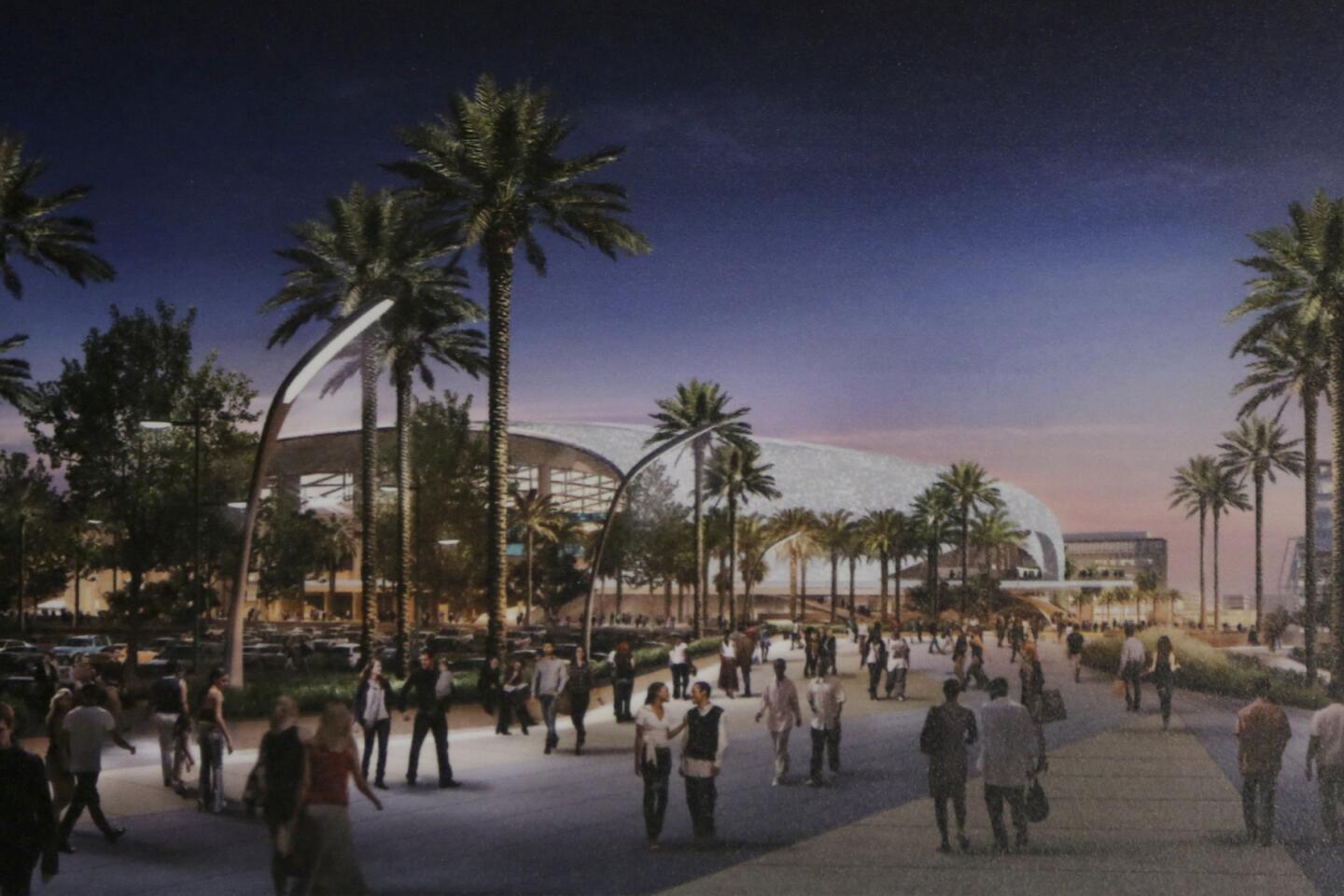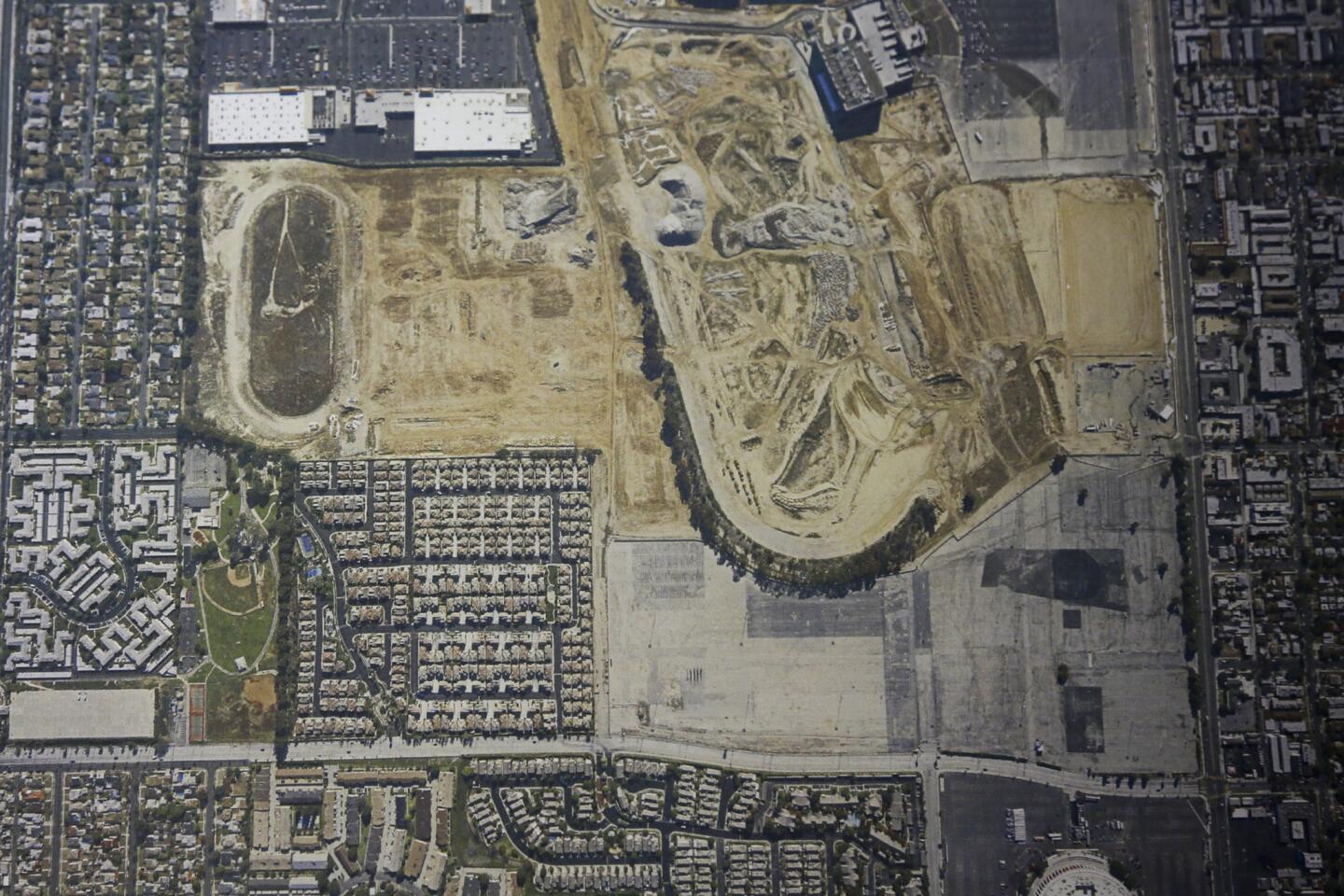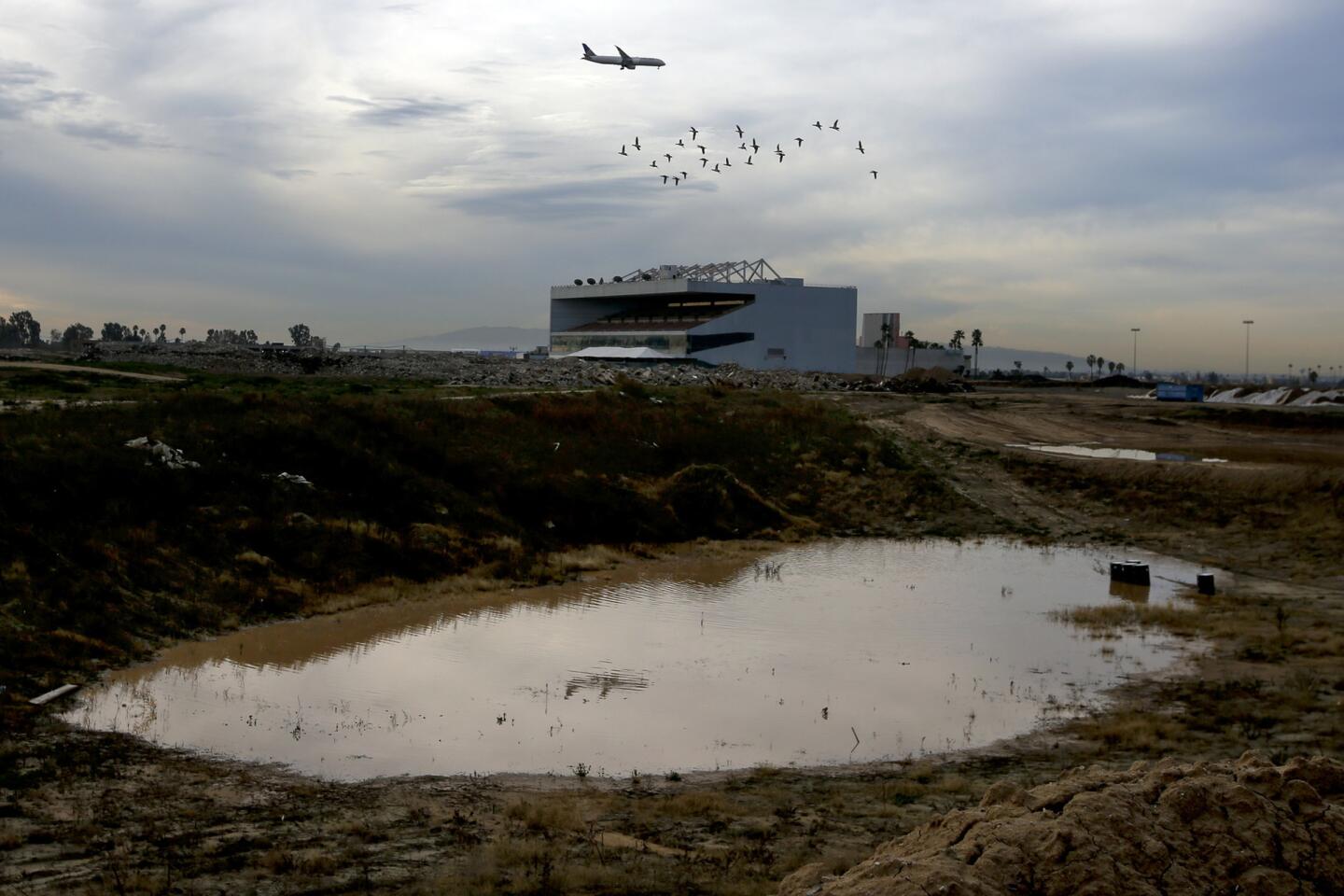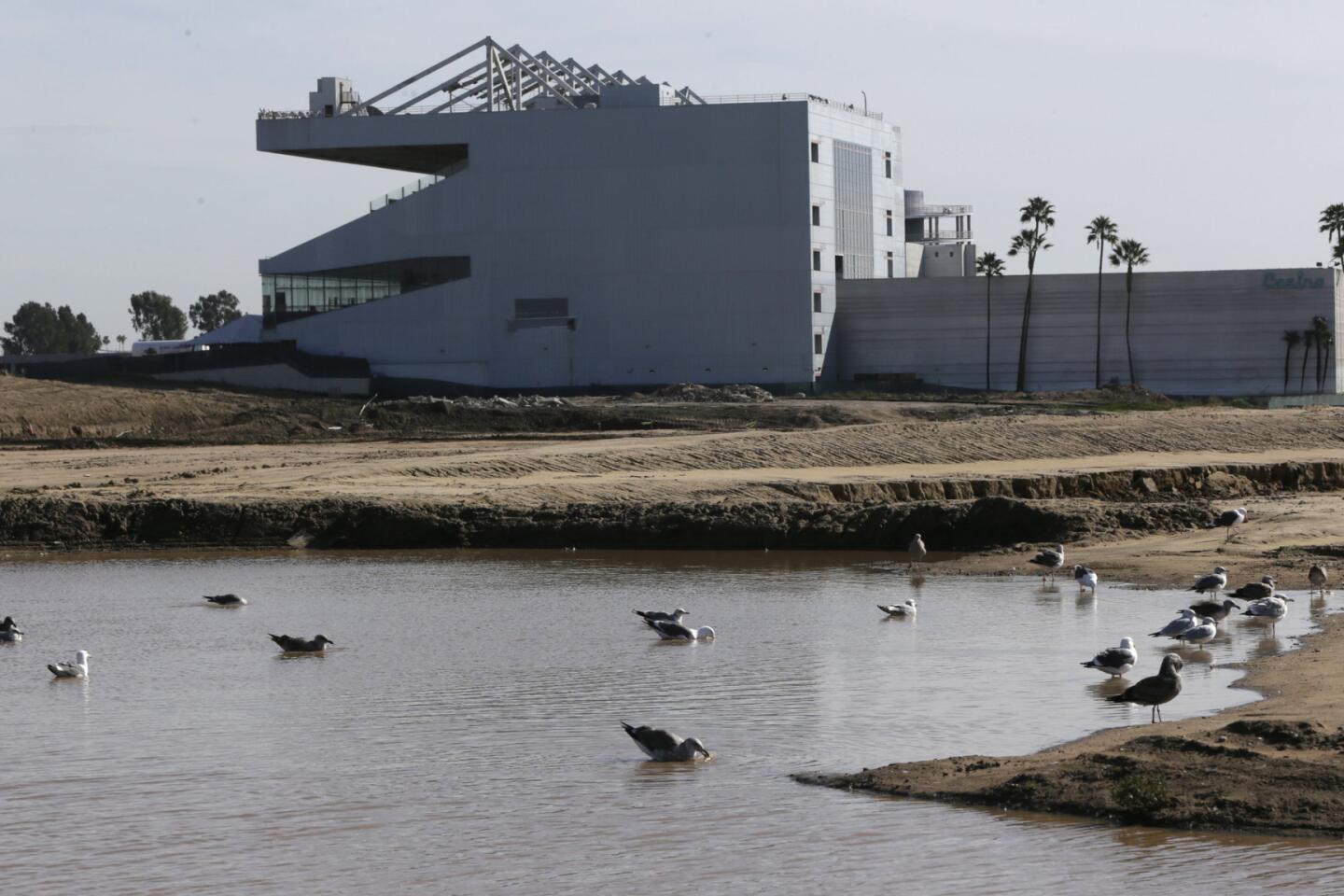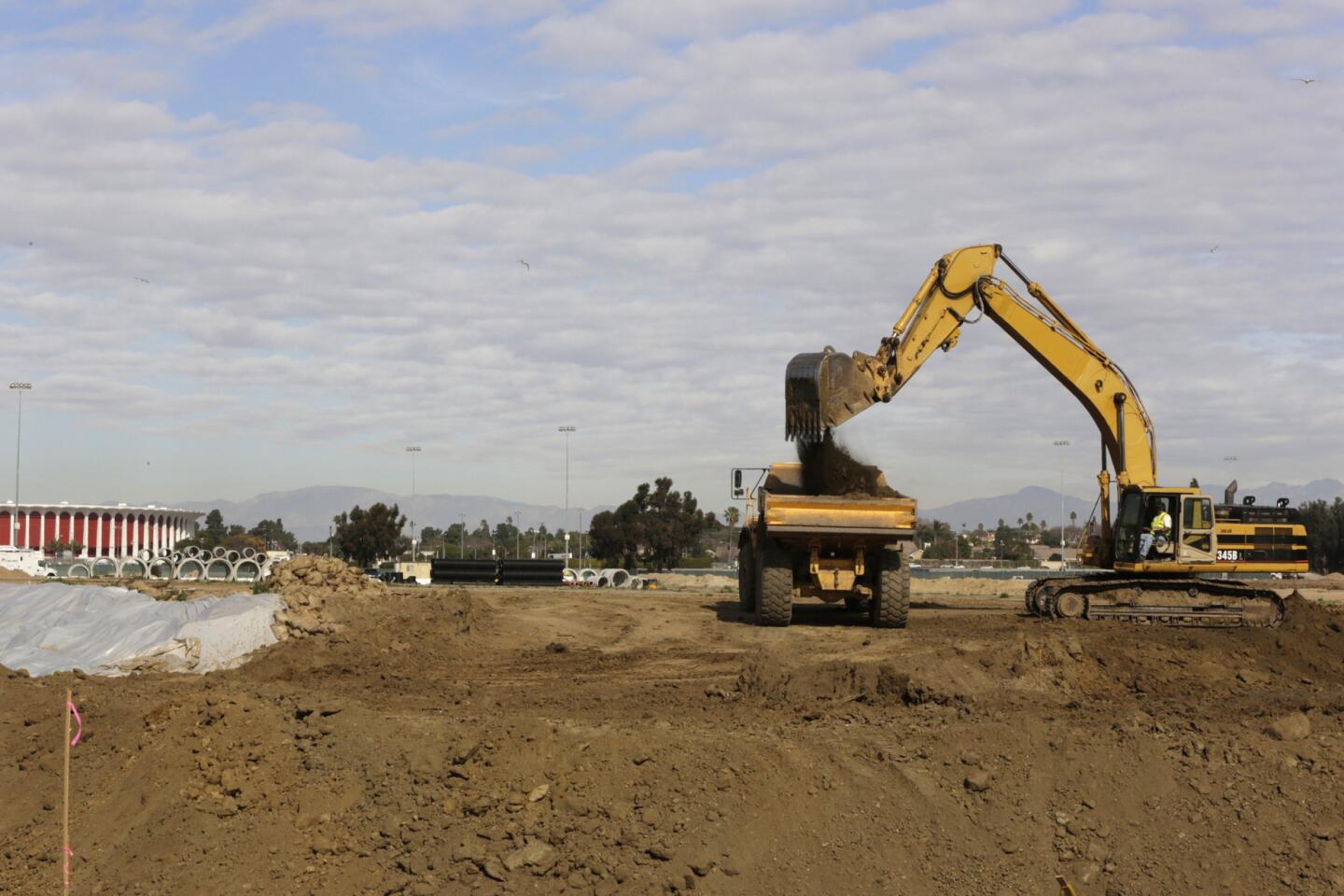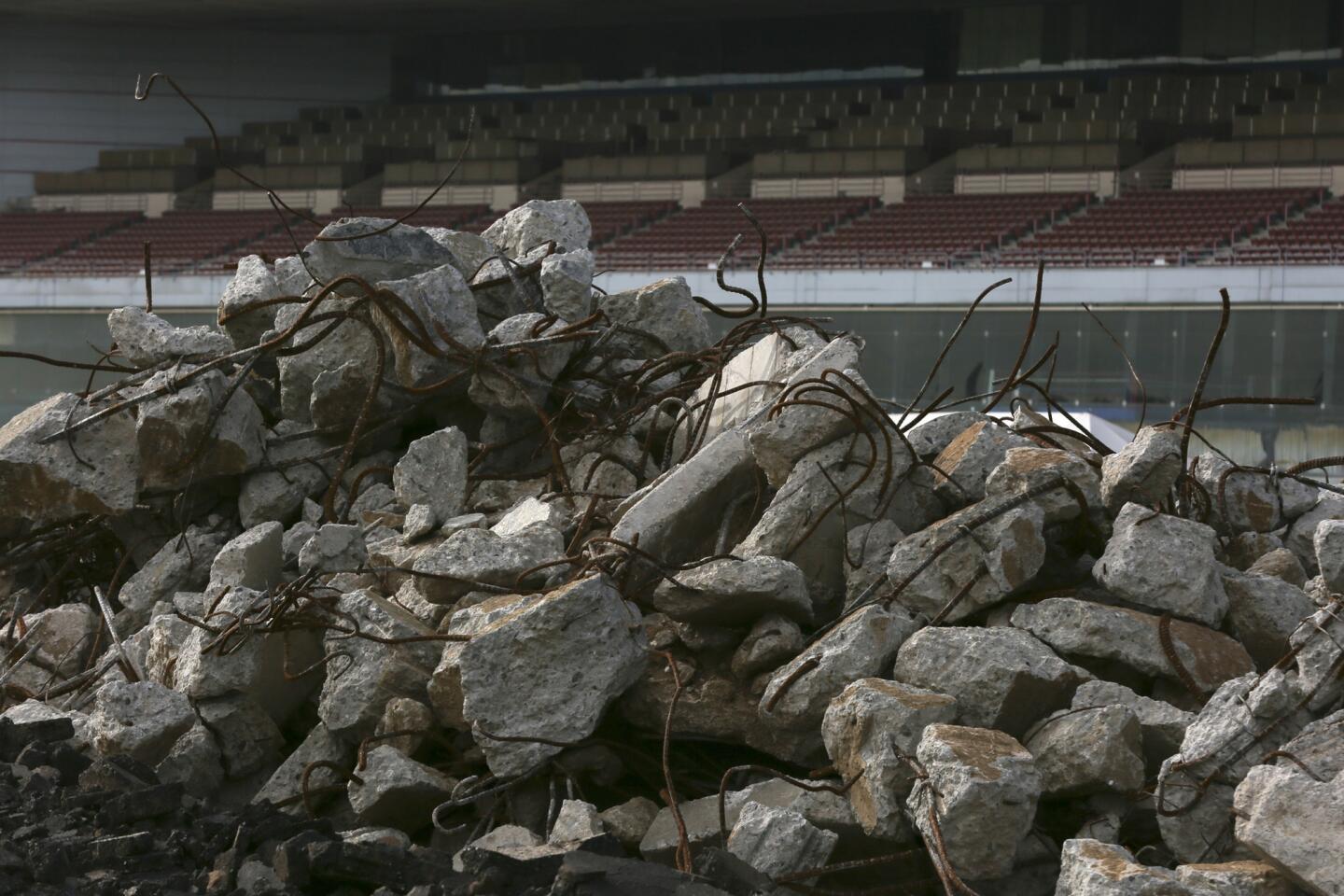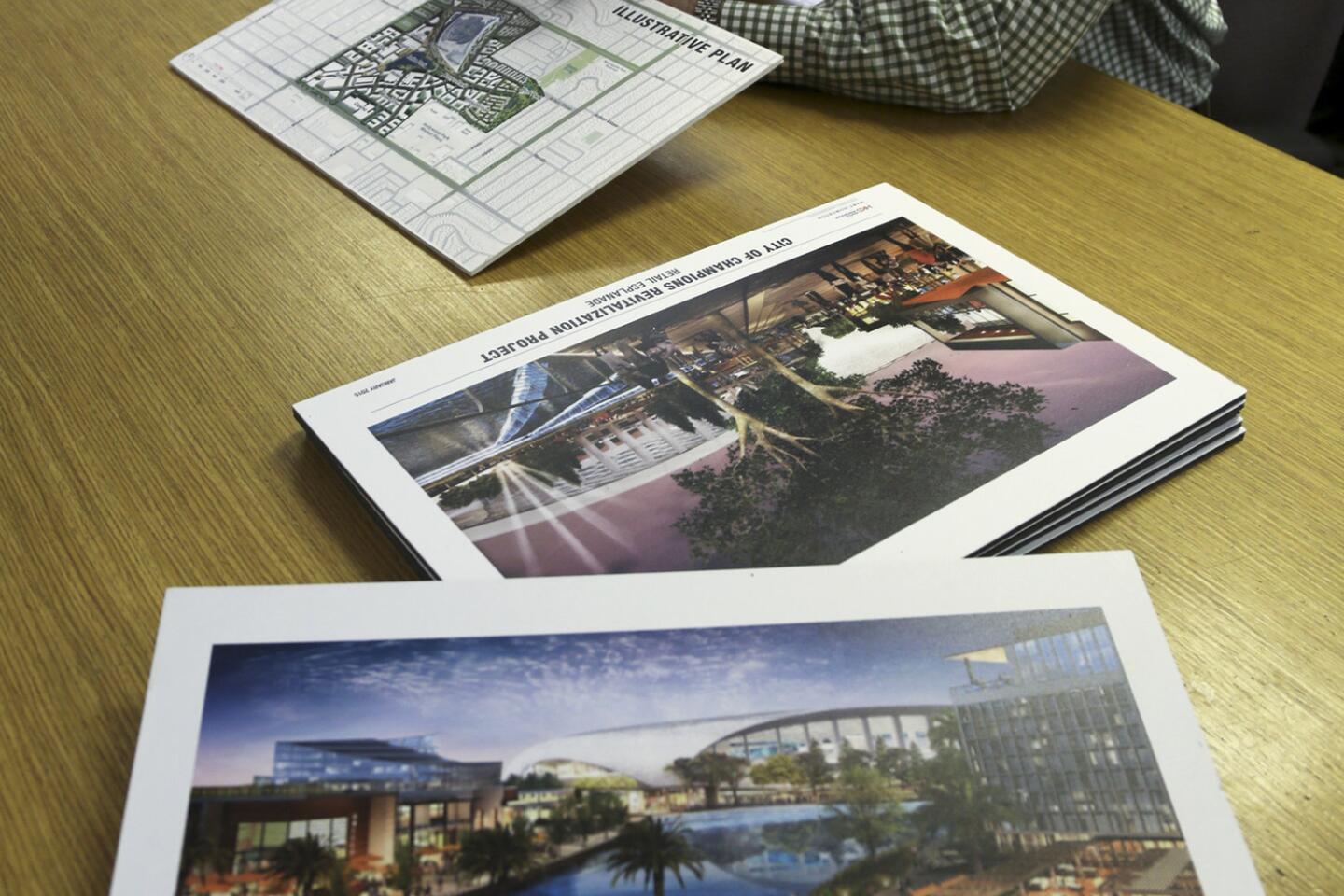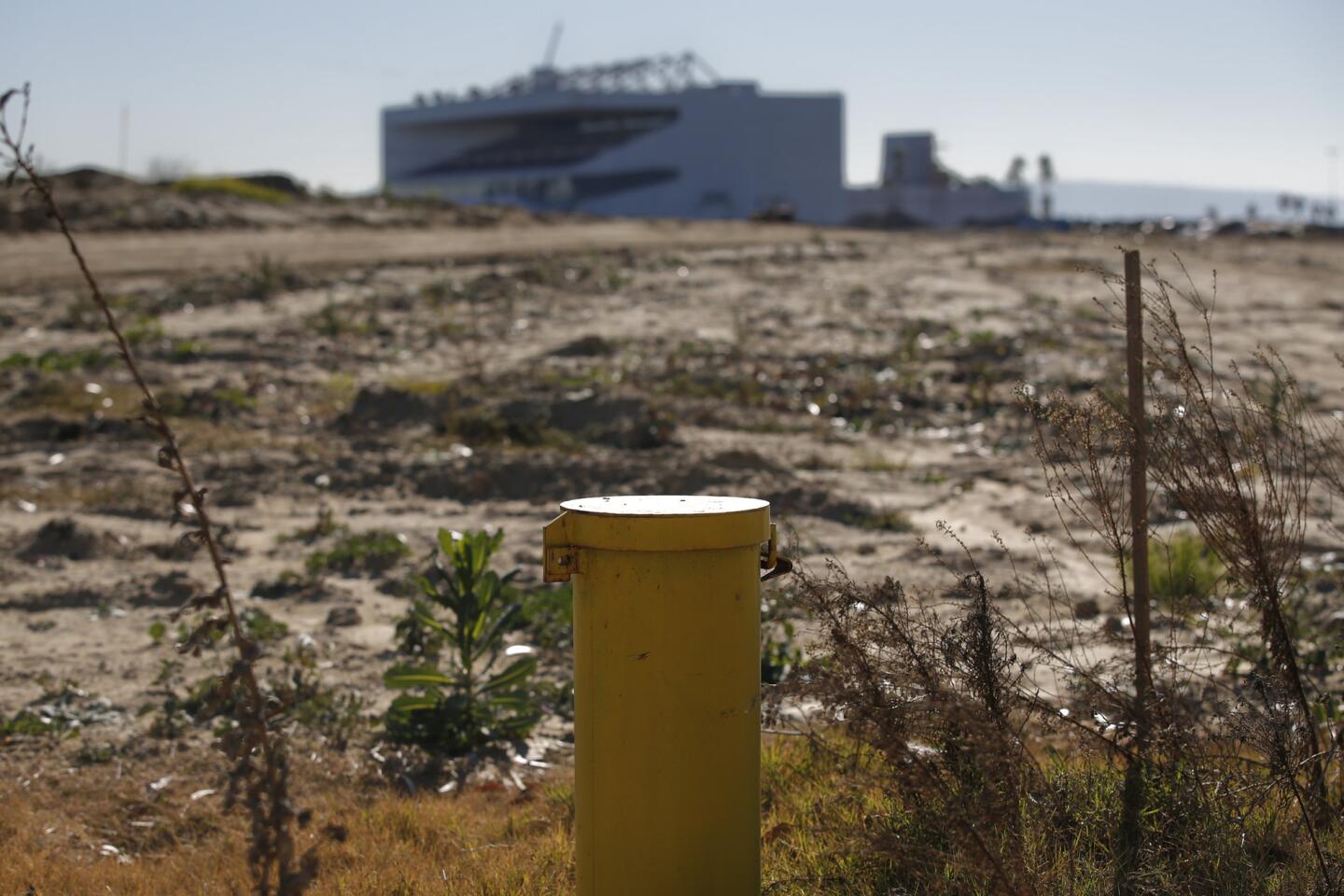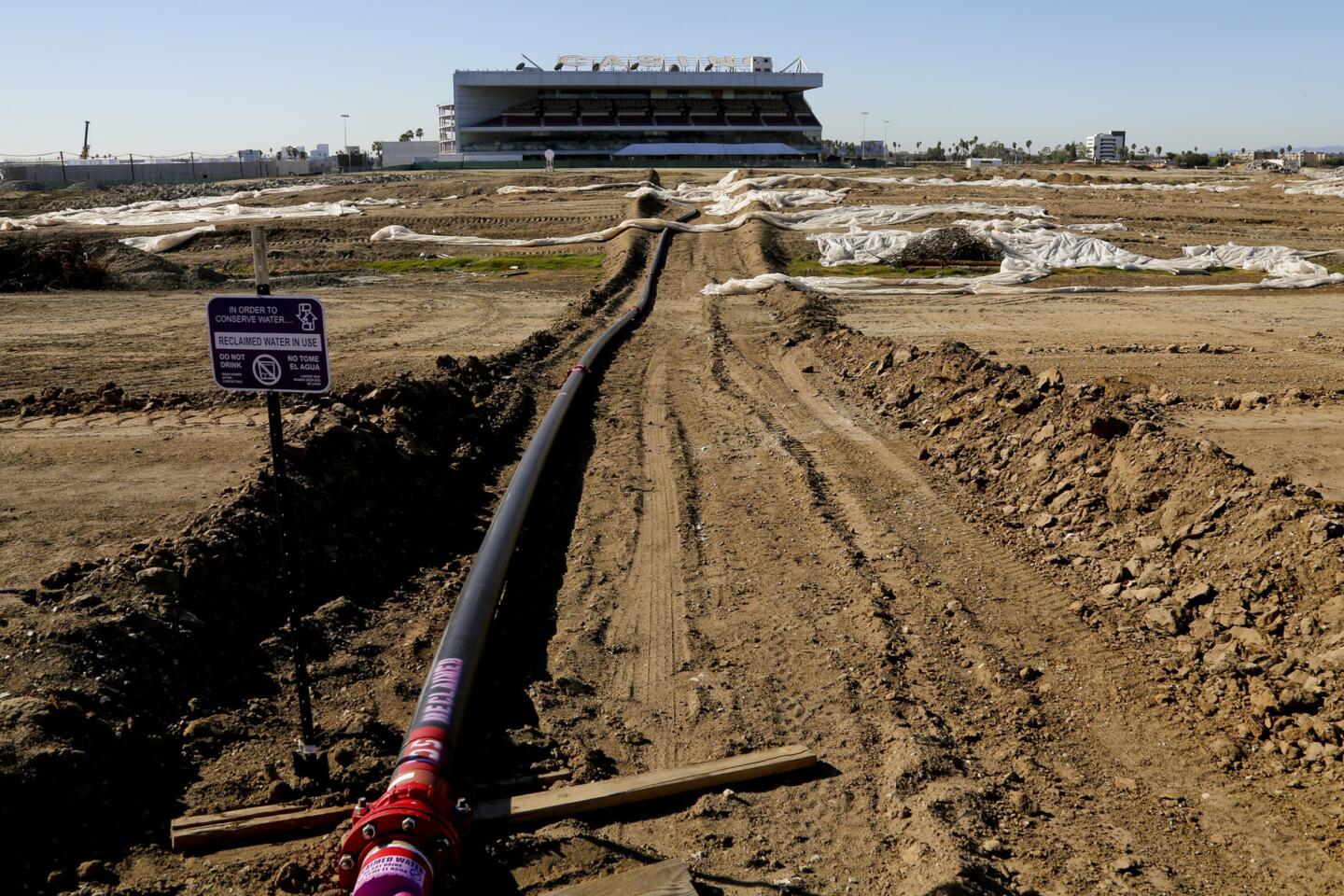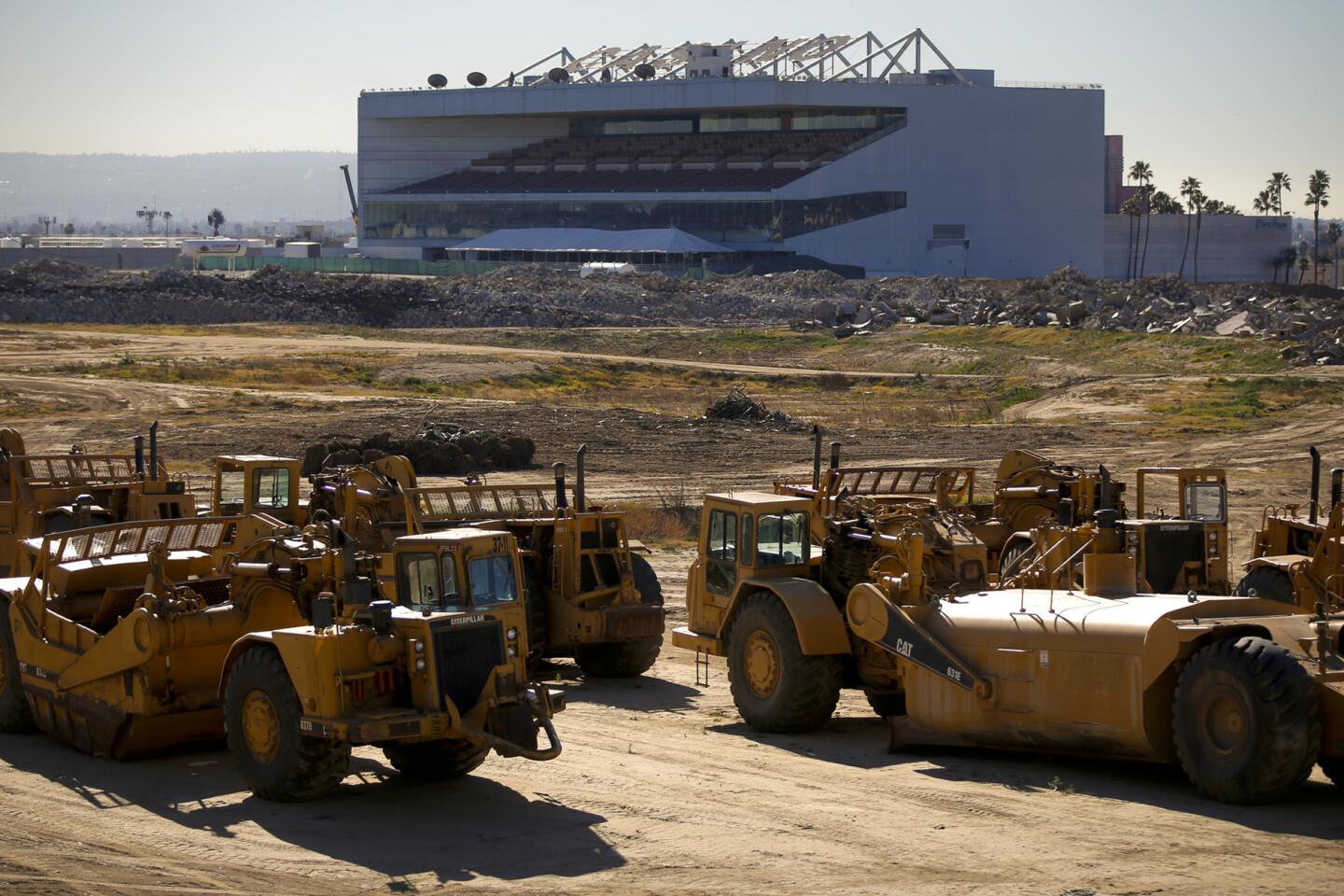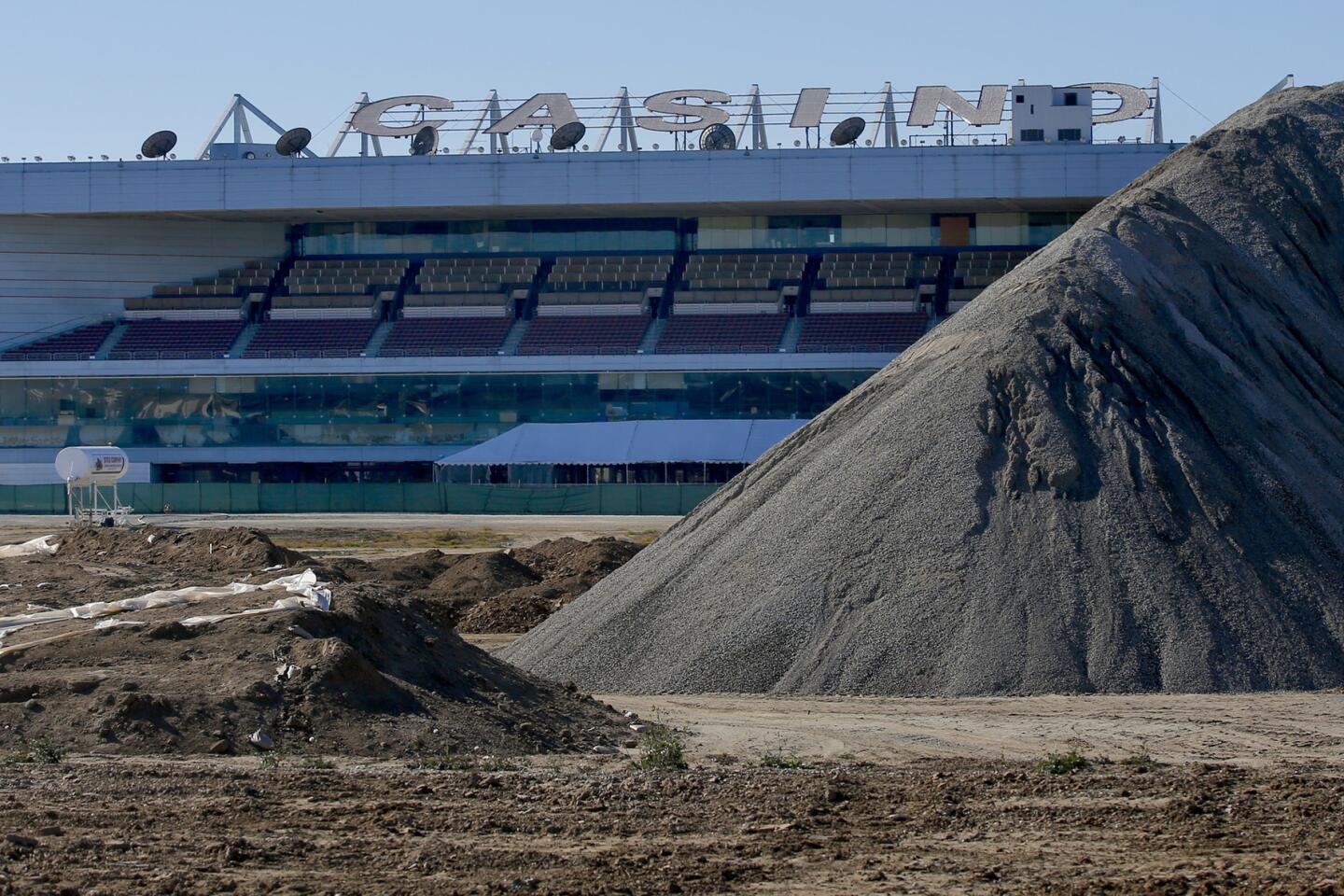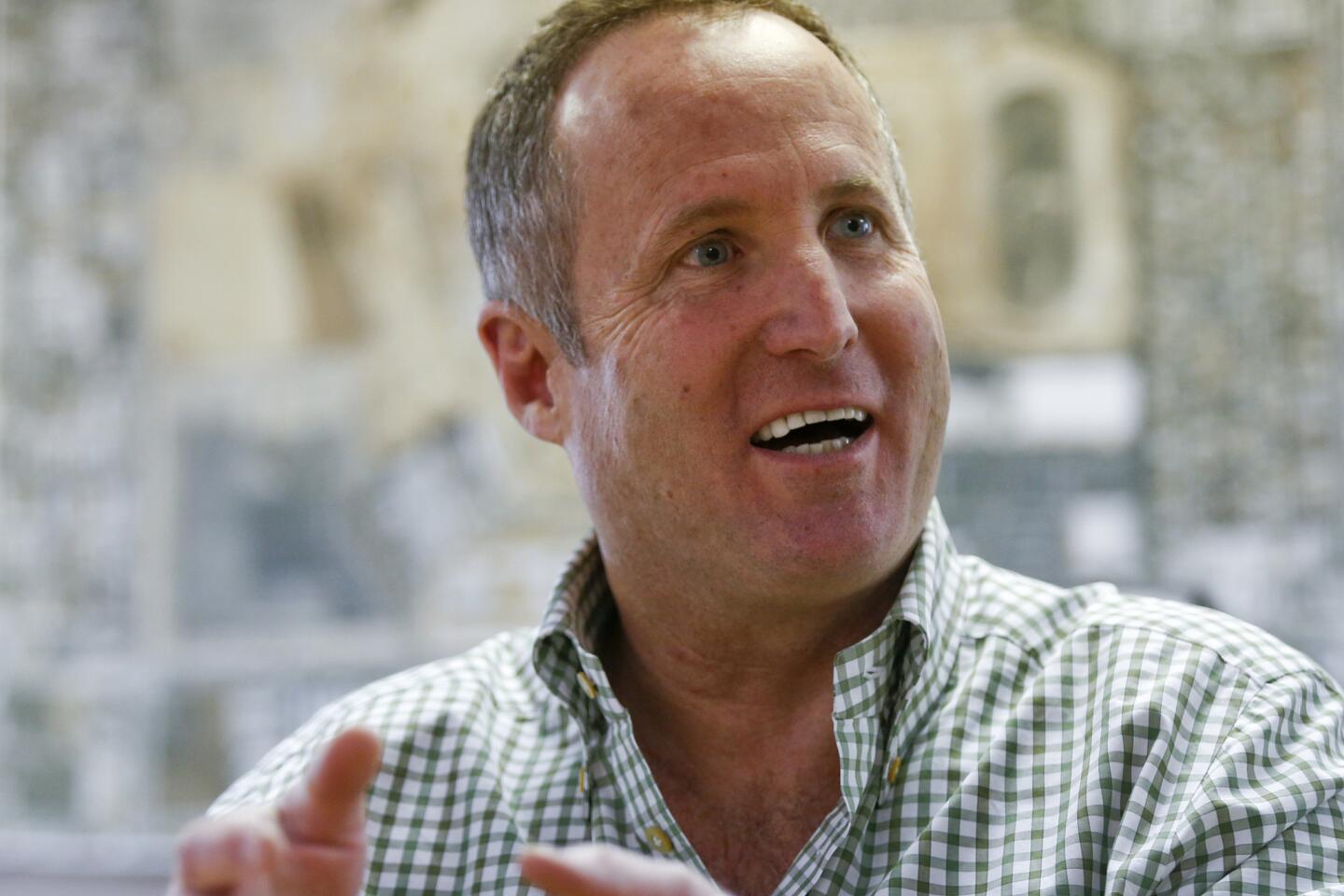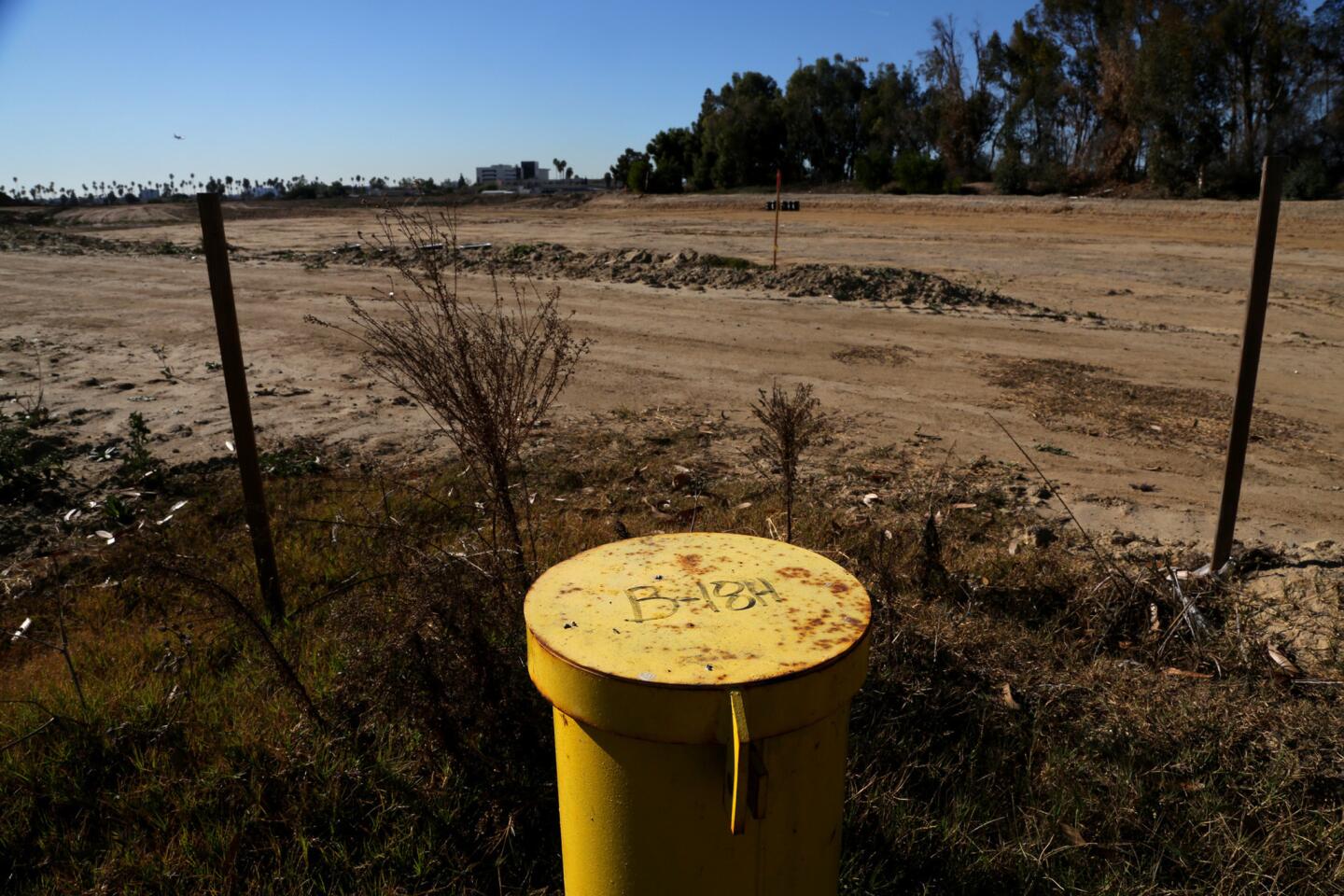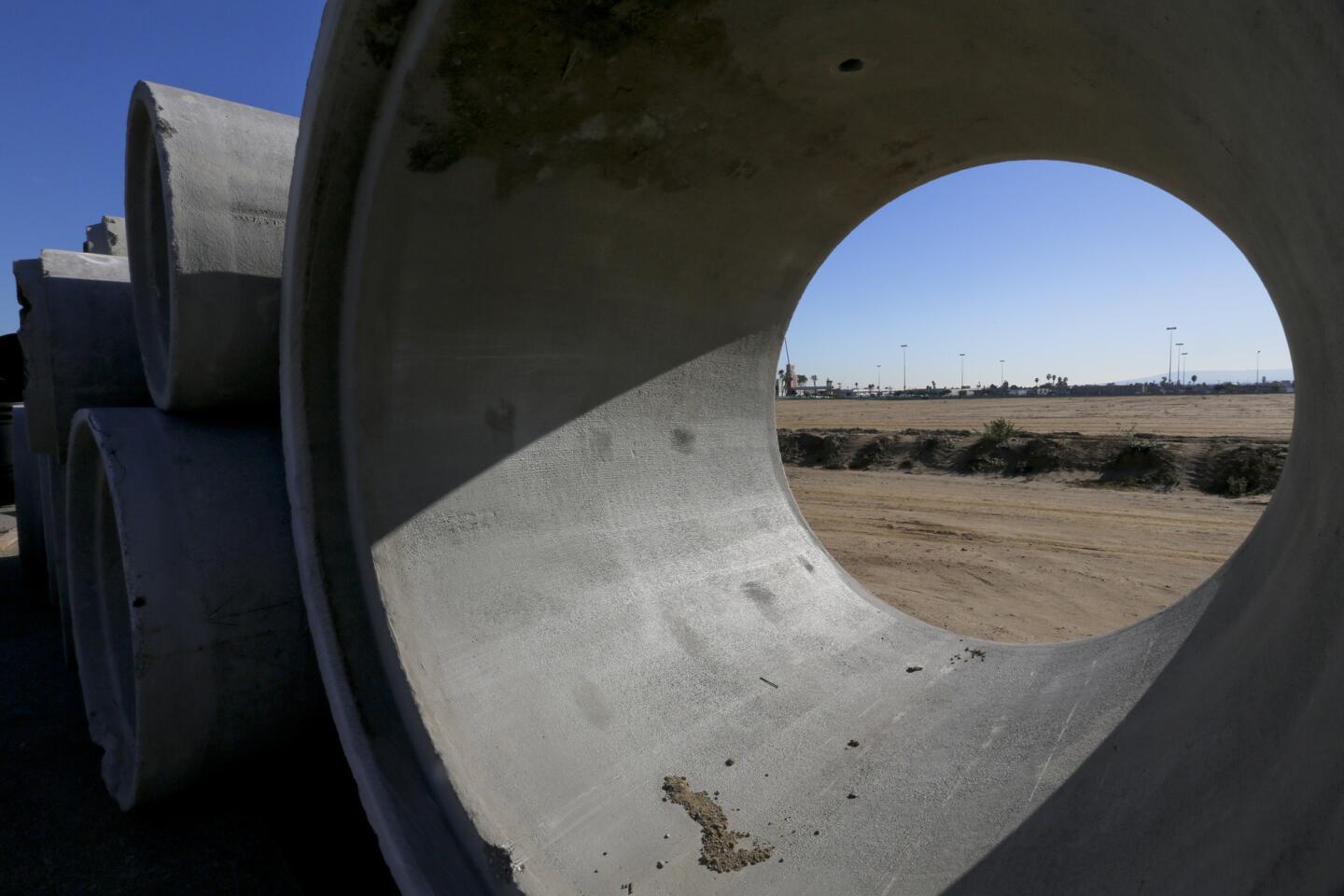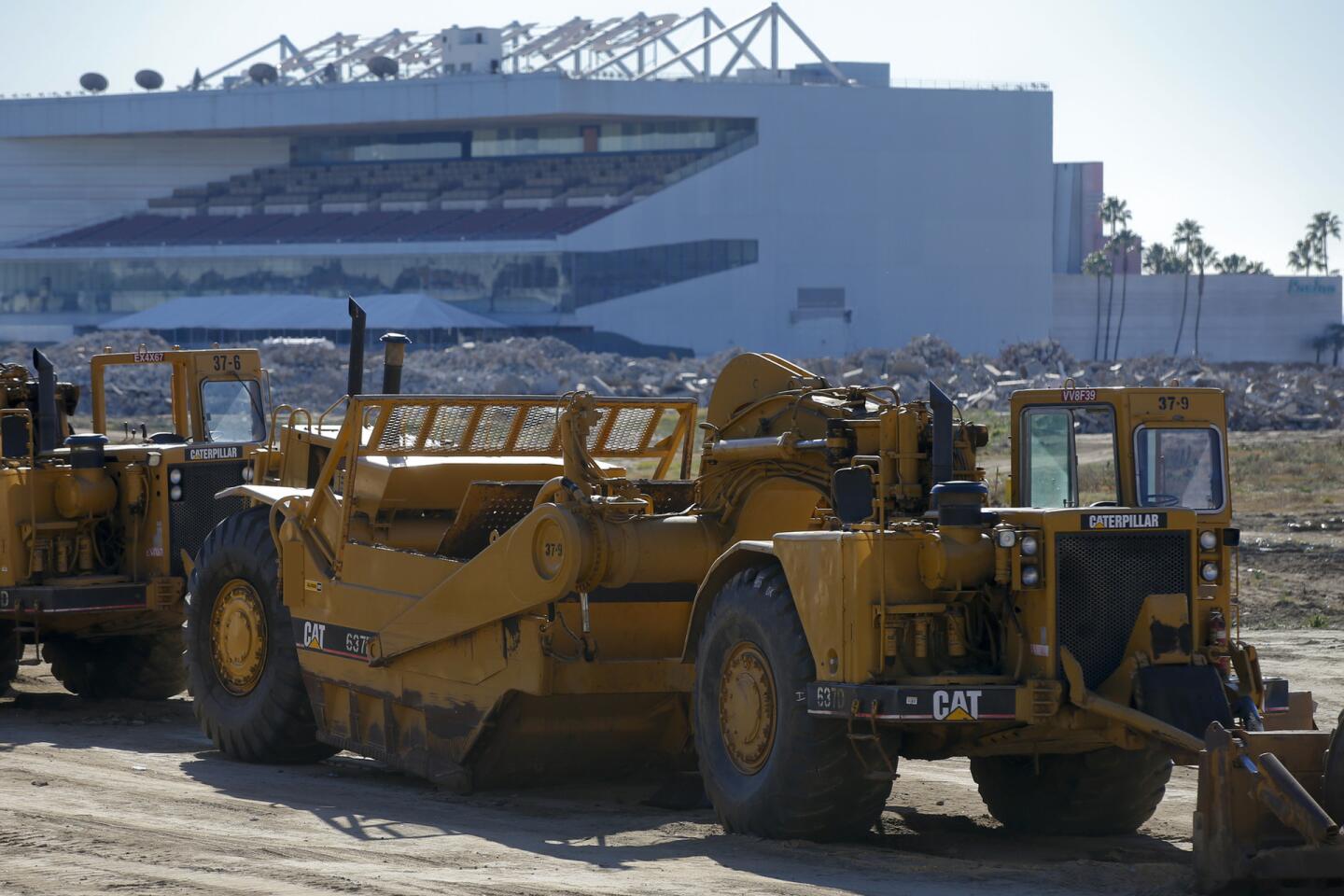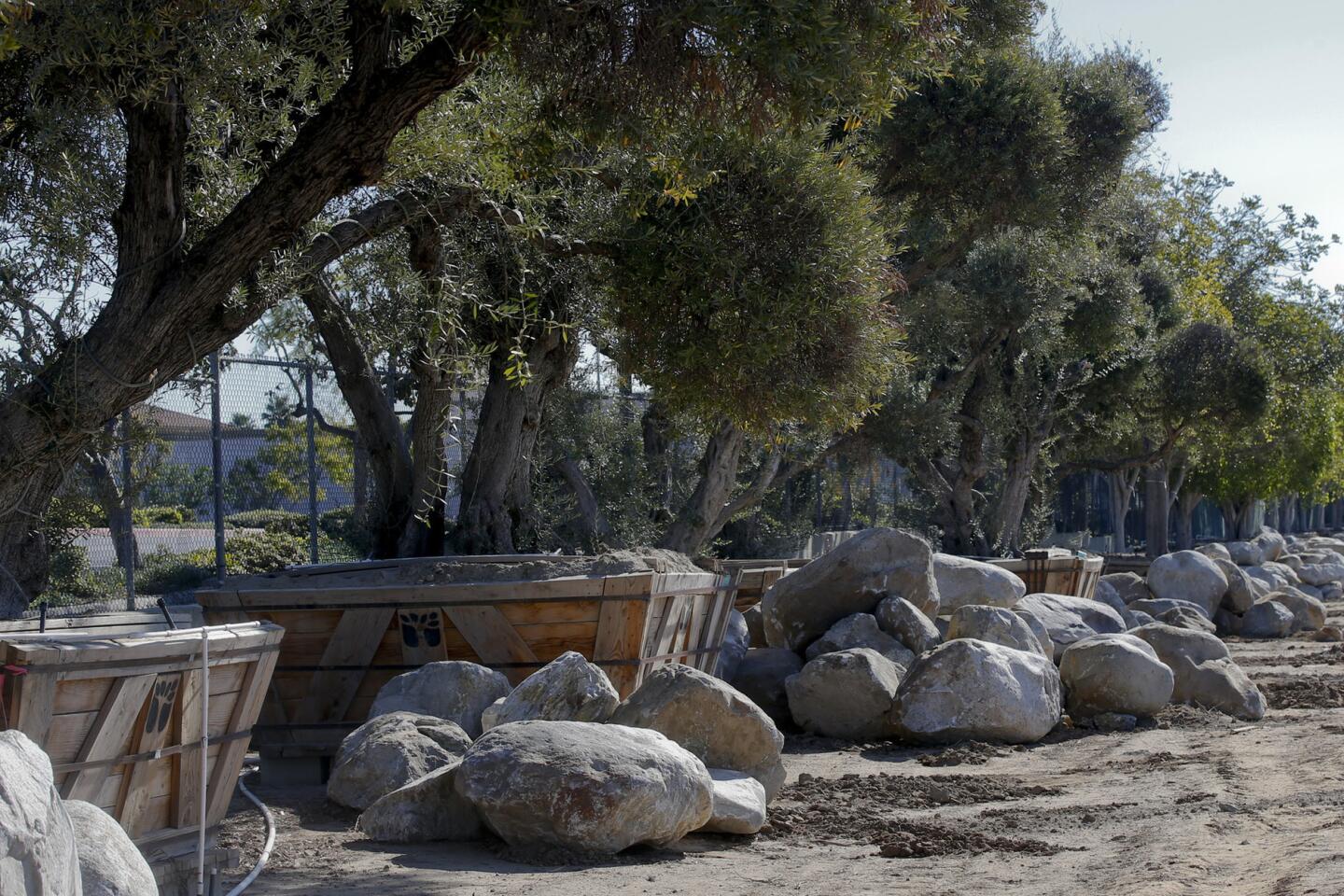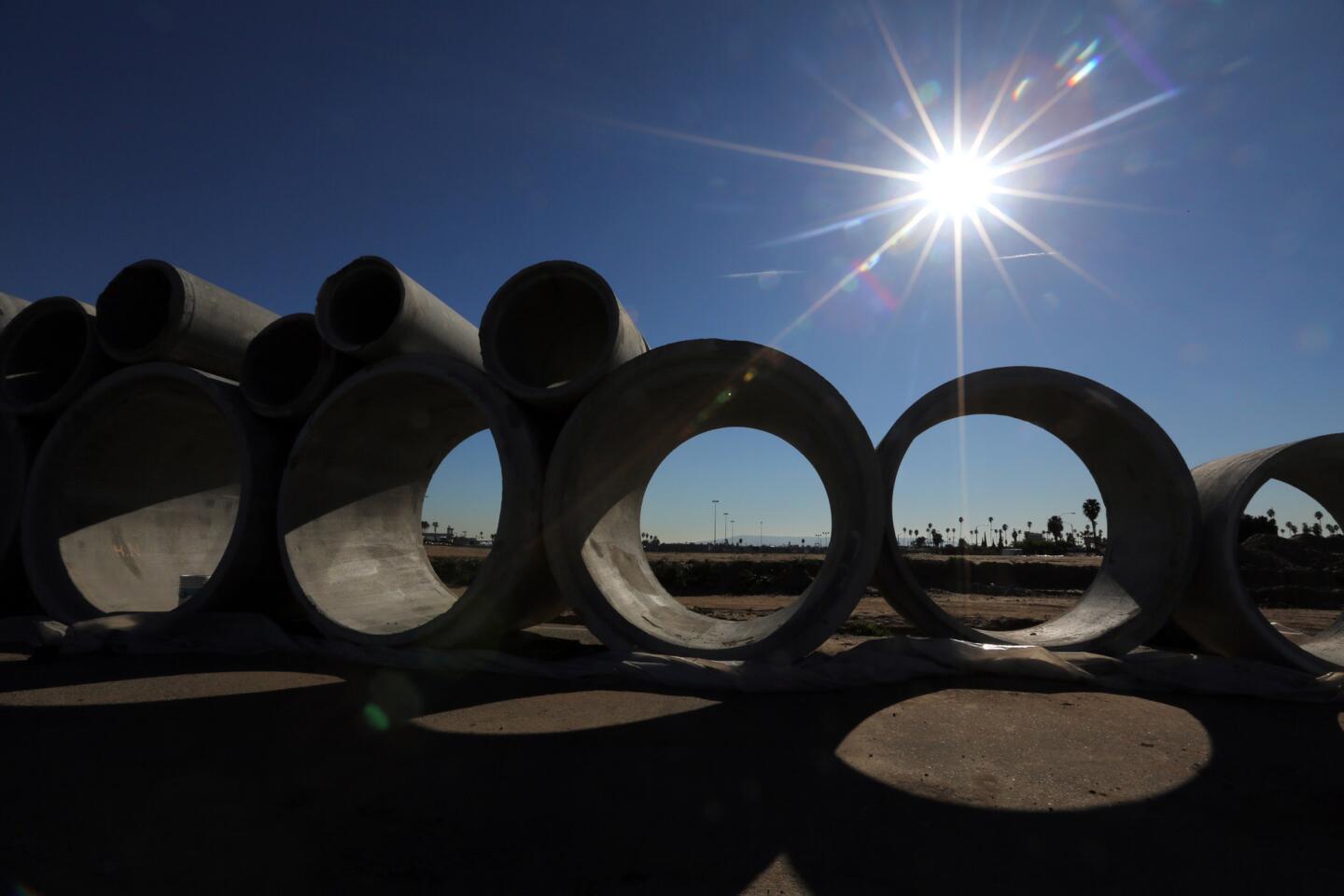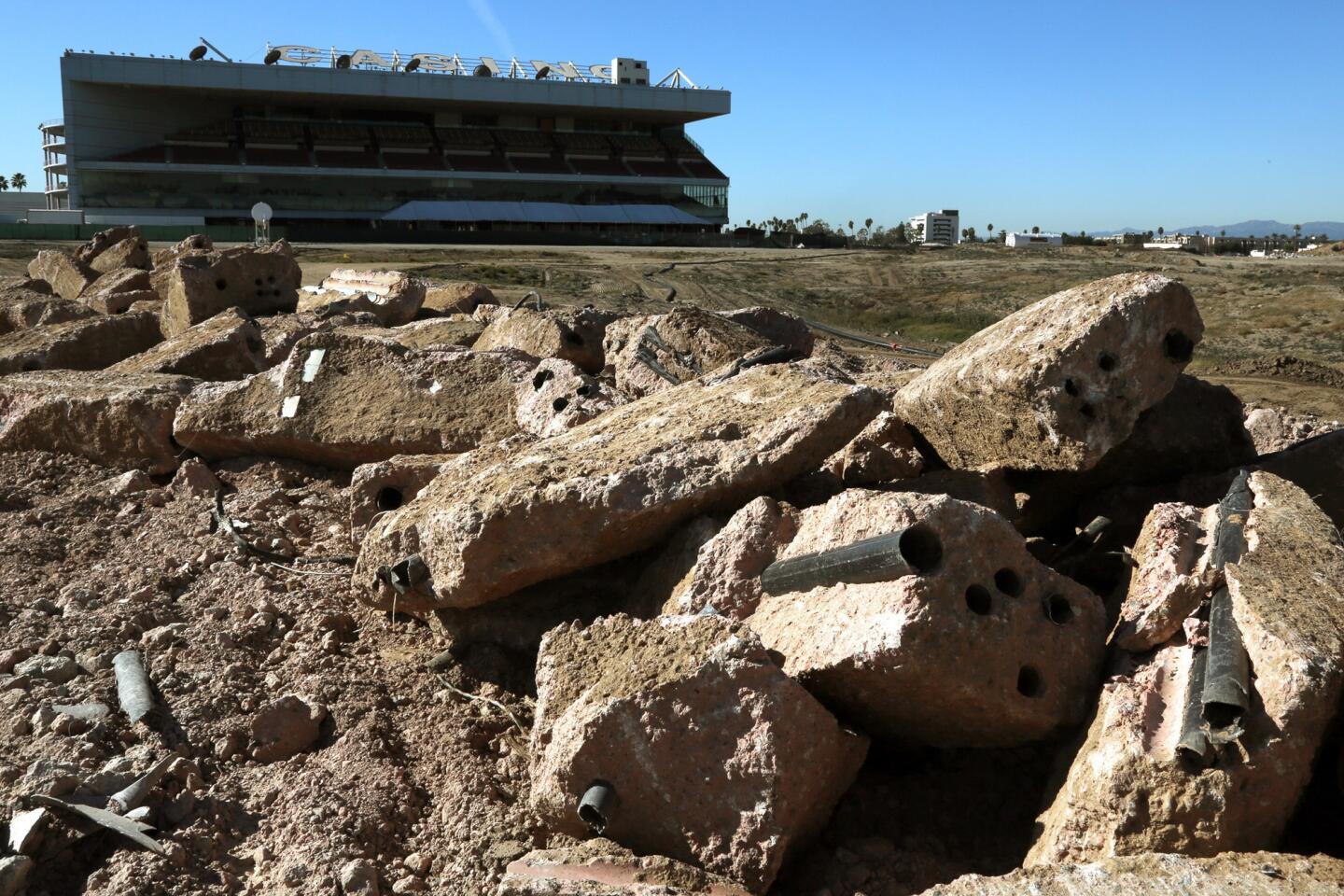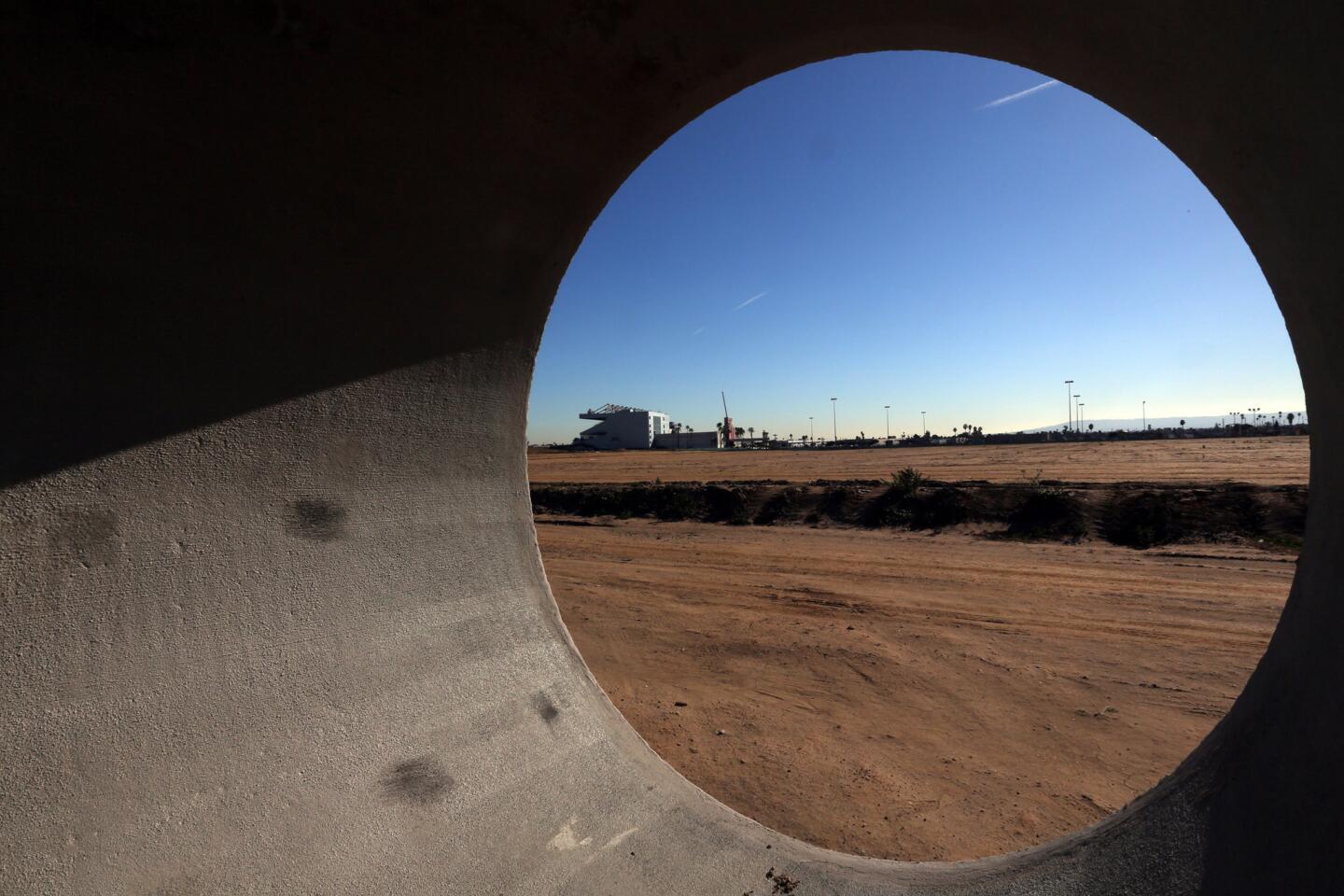Construction is underway at Hollywood Park site; if they build there, will NFL’s Rams come home?

Work is underway at the proposed stadium site at the former Hollywood Park. The project is designed to be a multi-use, NFL stadium, entertainment, retail, housing, hotel venue.
A small yellow pipe protrudes from the dirt on a massive construction site in Inglewood, where billionaire owner Stan Kroenke envisions the new home of his relocation-minded St. Louis Rams.
The pipe — dwarfed by heavy machinery and nearby mountains of crushed concrete — marks where the 50-yard line would be at the futuristic $1.86-billion venue.
In response to requests by The Times, the project’s developers agreed to give the first tour of the nearly 300-acre site since the proposal’s announcement in January. The Hollywood Park site, located about four miles east of Los Angeles International Airport, is almost three times the size of Vatican City.
See more of our top stories on Facebook >>
“We said we wanted to be in position to start building in a year,” said Chris Meany, development manager for the Hollywood Park Land Co. “And as you can see, we’ve done it. We are ahead of where we said we’d be.”
For two decades, the NFL’s return to L.A. has been little more than a pipe dream, the years littered with dozens of failed plans and proposals. A return to the nation’s second-largest market is far more realistic now, though, because NFL owners are personally invested, with Kroenke in Inglewood and the owners of the San Diego Chargers and Oakland Raiders teaming up on a competing stadium in Carson.
NFL owners will convene for a special meeting Jan. 12 and 13 in Houston in hopes of resolving the league’s two-decade absence from Los Angeles.
Regardless of whether the owners approve the Inglewood stadium, Kroenke is moving ahead with a mixed-use development that includes a hotel, housing, hundreds of thousands of square feet of retail and office space and even a lake with waterfalls.
“We are not aspiring to create Rodeo Drive,” Meany said. “We’re responding to create a place that is young and contemporary. The retailers are the kind you’d see at The Grove.”
Between 125 and 150 architects and engineers have been working full-time for months on the project’s design.
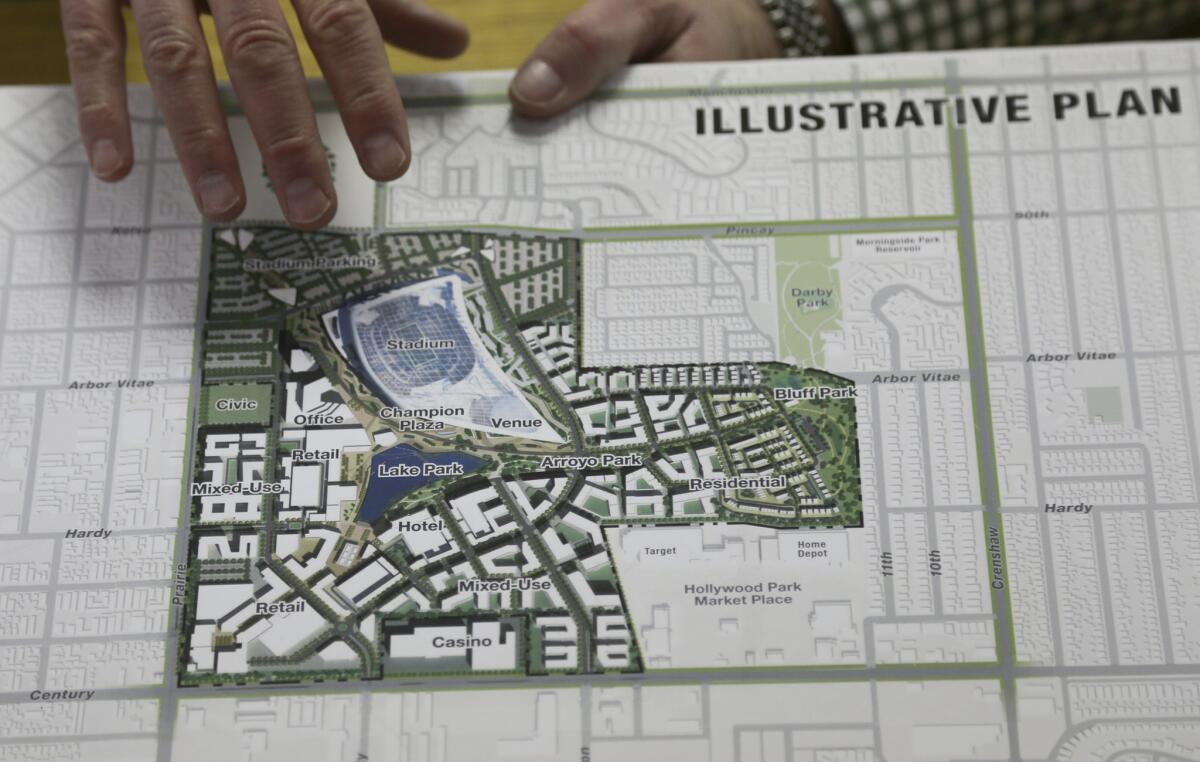
Chris Meany, Development Manager for the Hollywood Park Land Company, explains the plans to develop the site of the former Hollywood Park in Inglewood.
By Meany’s estimate, between 125 and 150 architects and engineers have been working full-time for months on the project’s design. On a typical day, the site is teeming with construction workers, contractors and consultants finishing infrastructure work.
Already, all of the site’s previous structures have been demolished except the casino. It will be torn down once its replacement is finished on the edge of the site.
About 116 tons of asphalt and concrete from the old buildings have been turned to rubble and will serve as the base for the project’s roads and parking lots. A new network of sewers and storm drains have been installed. So have 10,000 linear feet of underground piping for utilities.
Developers have rebuilt the entire edge of the property on both Century Boulevard and Prairie Avenue, putting in new curbs and sidewalks along with turnout lanes to enter the property. All of the surrounding streetlights and traffic signals have been installed, too.
One border of the project hosts 110 full-grown trees — olives, sycamores and willows — alongside dozens of hulking boulders. Plans are so advanced that each tree and boulder, all salvaged from the old site, has a predetermined home on the new one.
The development’s plans are about three feet thick, including 4,300 pages of stadium drawings. Developers are completing the final construction documents — the detailed building instructions down to where each rivet goes — and continuing the permitting process with dozens of agencies including the Federal Aviation Administration.
Last month, the FAA said in a preliminary report that the stadium is “presumed to be a hazard to air navigation.” The FAA is concerned about how LAX radar would interact with the stadium’s exterior.
The report, to which the developers have until early January to respond, isn’t a final determination, but a starting point for negotiations. Developers don’t expect the issue — common for projects near large airports — to derail the project.
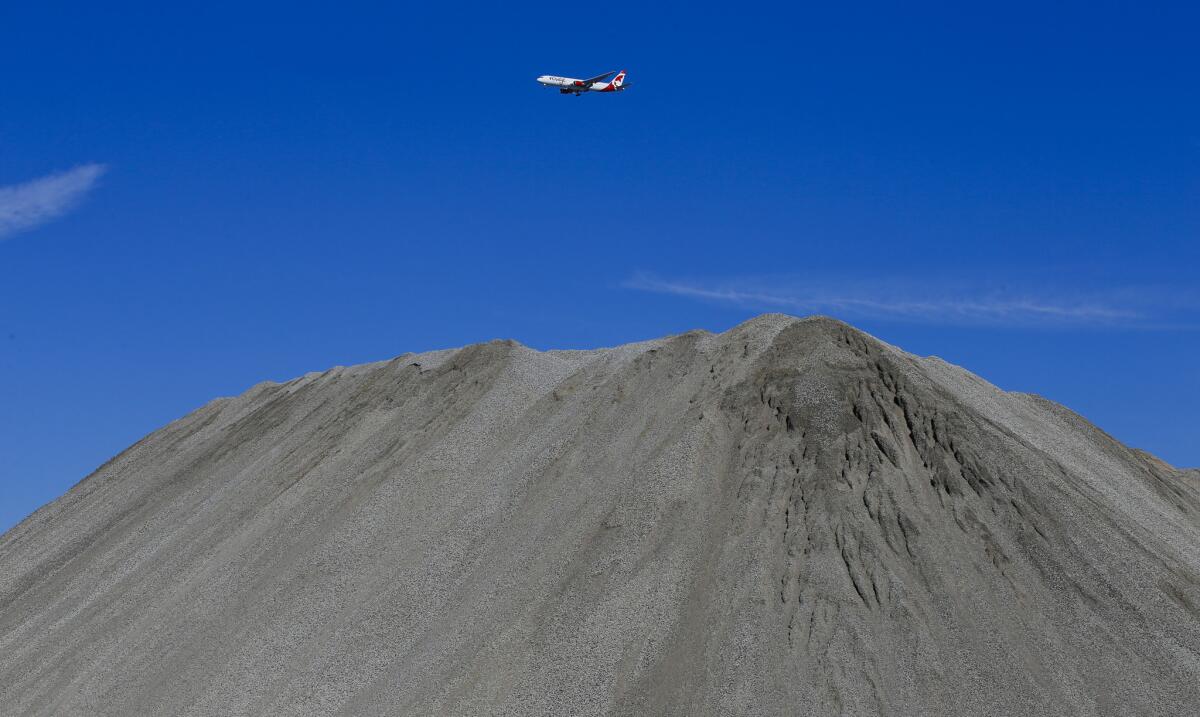
An airplane making its final approach to LAX flies over a hill of crushed concrete at the former Hollywood Park site in Inglewood where an NFL stadium will eventually be constructed.
“The FAA is super important,” Meany said, “like a dozen other agencies.”
Plans call for a sail-shaped roof that’s twice as big as the stadium and shelters the football field, an adjacent 6,000-seat performing arts venue and the “Champions Plaza” in between. The light metallic covering would provide weather protection but remain open on the sides, allowing the venue to host large indoor events like the Final Four, concerts and conventions.
The roof would have metal borders but the area over the playing field is to be made of a transparent material called ETFE, which is said to be as clear as a car windshield while strong enough to support the weight of a vehicle. Developers say the design allows for breezes to flow through the building and enhance the outdoor feel.
Whereas the roof of the stadium would be 275 feet above the field, the building would be set into the ground and have an above-ground profile of 175 feet, creating a sleek, low-slung look that blends with the surrounding development.
Meany said that for the largest events the stadium would require 21,000 parking spaces. There would be about 9,000 on site — including more than 1,000 VIP spaces under the venue — and Hollywood Park traditionally had a reciprocal agreement with the Forum that made 3,000 more spaces available. A study by the developers determined there were 41,000 parking spaces — not counting those at retail centers — within 1.5 miles of the stadium.
“I believe this is the most parking-rich location in the Los Angeles basin,” Meany said.
This isn’t a small aspiration. We are trying to do something that is grand and is appropriate for an international stage.
— Chris Meany, development manager for the Hollywood Park Land Co.
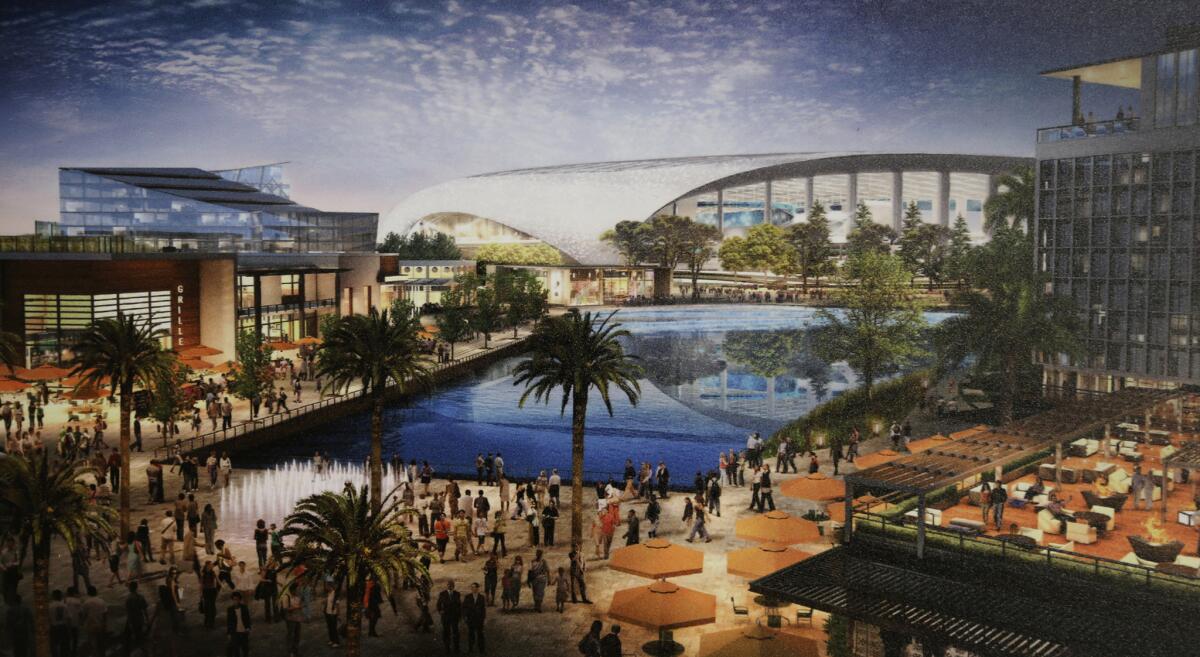
A rendering of the plans to develop the site at the former Hollywood Park in Inglewood as a sports, retail and entertainment venue that will include an NFL stadium.
When viewed from the air on the approach to LAX, the site looks like a brown scar in the midst of urban sprawl. At ground level, the vast scale of the project is more apparent, about as large as Boston’s downtown financial district.
If developers get the green light from the league, they say, stadium construction can begin within a couple of weeks.
“Our instructions from the Kroenke organization [are] that we would design an entertainment district that would rank globally,” Meany said. “This isn’t a small aspiration. We are trying to do something that is grand and is appropriate for an international stage.
“Whether or not there’s going to be a stadium depends on the NFL.”
[email protected] Twitter: @LATimesFarmer
[email protected] Twitter: @nathanfenno
ALSO
Big loss leaves even Magic Johnson almost tweetless
For the New York Islanders, Brooklyn is beginning to feel like home
NFL’s one-game suspension of Giants’ Odell Beckham Jr. feels a little like a wrist slap
More to Read
Go beyond the scoreboard
Get the latest on L.A.'s teams in the daily Sports Report newsletter.
You may occasionally receive promotional content from the Los Angeles Times.
